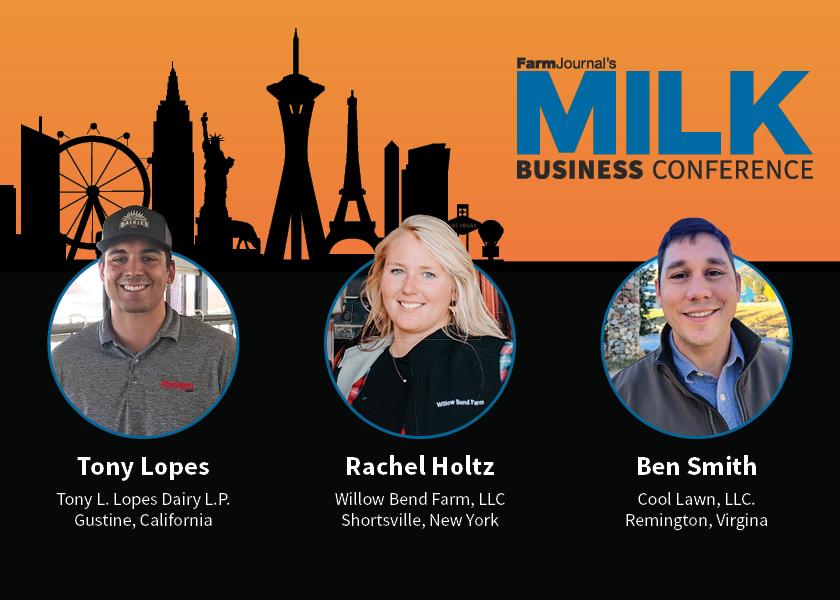Young Dairy Farmers Offer Fresh Perspectives at Milk Business Conference

Called the ‘participation trophy’ group, often the younger generation gets a bad rap. However, younger generations have a lot to offer in terms of technology, fresh perspectives and innovative ideas. Three young dairy producers talked about the opportunities, challenges and their path back to the farm at the 20th Anniversary of the Milk Business Conference in Las Vegas, Nev.
California dairy producer Tony Lopes from Gustine says one area where he feels like he has made the most positive impact on his dairy is with employee turnover.
“As we tracked some of our KPIs across time, one of the ones that I was most proud of was the decrease that we’ve had in our employee turnover,” he says. “Maintaining higher levels of employee retention dramatically decreases our workman's comp incurred, annualized in incurred costs, which I attribute to just building a culture, engaging with these team members, and training them so that they're able to succeed within their role.”
Along with his parents Darlene and Paul, Lopes milks 4,000 Holsteins on four separate facilities in a 2-mile radius, along with managing a 2,500-head beef-on-dairy feedlot and farms approximately 2,000 acres.
Lopes shares that what the KPI numbers can’t quantify is what exactly is unfolding on his family’s dairy. The fact that everyone is engaged, working together—both new employees, as well as employees his grandfather hired, is something Lopes takes great pride in.
“I've been really excited to see that and grateful for the opportunity to work with the guys who I get to work with,” he says.
Lopes came back to the family farm in 2018 after graduating from Cal Poly in San Luis Obispo. During college, Lopes did two internships and spent a portion of one summer in Seoul, South Korea, doing marketing on behalf of the California Milk Advisory Board.
“I'm very grateful for everything I learned along the way, but ultimately the opportunity did exist to come back to assist my family with managing our facility and I felt that was where my place in the industry to really succeed would be,” Lopes says.
In New York, Rachel Holtz of Willow Bend Farm, LLC, milks 5,200 cows in Ontario County on three different sites. Additionally, they farm 10,000 crop acres and raise around 4,800 heifers.
Holtz shares a few things that she is proud of, including being a woman in agriculture.
“Bringing that empowerment to get girls to work,” she says, “We had an all-girls calf team at one point, and I think we really bought that to the next level.”
Holtz concurs with Lopes, saying that she has seen a lot of cultural change unfold on her New York farm.
“We had to establish core values,” she says. “I’ve been part of that whole process and during the onboarding and its way better now for our employees. I’m proud of that.”
Holtz path is unlike many young dairy producers, as she didn’t come from a farm background. When she was 13 years old, she rode with her father, who was a highway superintendent, and passed a dairy with lots of calf hutches and knew that she wanted to work on that farm. Which she did and still does.
“When I started there, I kind of fell in love with it and didn't really know where to go,” she says. “I didn't come from a family background and just worked my way up on this farm.”
Fourth-generation dairy farmer, Ben Smith, from Remington, Va., owns and operates Cool Lawn, LLC., an 800-cow registered Holstein herd, consisting of 17 employees, and 3,000 rented and owned acres. Smith helps with his family’s ice cream business, Moo Thru. Along with the dairy, Smith operates a hay business producing over 2,000 tons of quality hay for equestrian use.
After graduating from high school in 2010, Smith spent a summer working in South Dakota working on a harvest crew.
“I thought that was important because it was my first time really being away from home and learning how to live and work with other people,” he says.
He then attended Virginia Tech’s two-year program. He had the opportunity to travel to Pennsylvania and then to Germany, where he made a lot of good contacts. Smith also worked on a 7,000-cow dairy in Georgia before he returned back home in 2013.
Smith is proud of the accomplishments he has helped make for his farm in the ten years he has been back on the farm.
“From 2013 to today, our farm looks a lot different,” he says.
Like Lopes, Smith’s dairy has a lot of long-term employees who have watched him grow up.
“I’m now the one that writes their paycheck,” he says. “I was really concerned about how the transition would go.”
Smith attributes all the years prior, working side-by-side with them and understanding what they liked and didn’t like and putting some systems in place.
“I'm most proud of the people that are there and allow me to be here today,” he says.
Smith is also proud of his herd of cows and embracing technology, like activity collars and automating payroll.
To watch the entire Young Producer panel from the 20th Anniversary of the Milk Business Conference, click on Young Cooperators Panel at the MILK Business Conference - YouTube







